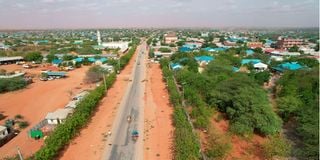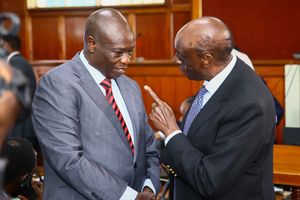How devolution has spurred Mandera’s economy

An aerial view of Mandera town where trees have been planted along the road, governmental institutions and homesteads.
What you need to know:
- At 27,000 square kilometers, Mandera is more than twice the size of what was previously called Central Province.
- The Mandera Referral Hospital serves as a regional hospital for the adjacent areas in all three countries.
Citizens and county officials in Mandera County are very enthusiastic about devolution on account of the visible, positive difference it has made. From education to health, roads, the construction sector, tourism and hospitality, the effects of County investments are everywhere. At 27,000 square kilometers, Mandera is more than twice the size of what was previously called Central Province. Over one million people live in six sub-counties.
The Kenya National Bureau of Statistics (KNBS) is now publishing the Gross County Products (GCP) Report regularly. The most recent estimates Mandera’s economy at Sh63 billion at the end of 2022. To be expected, livestock and crop agriculture account for the largest portion, at 29 per cent of the total. The livestock population includes 1 million camels, 3.2 million gala goats, 833,000 sheep, 760,000 cattle and 176,000 donkeys. Public administration is the second largest sector 28.2 per cent, reflecting the presence of various security organs.
Devolution has spurred construction which now accounts for 8.3 per cent of the GCP, and real estate activities (6.1 per cent). County investments in education and health bring the sector contributions to 6.1 and 6 per cent respectively.
In policy circles, there is intermittent debate about how Kilimo House has over the years focused on crop agriculture to the detriment of livestock. At farm gate prices, the value of cattle traded annually for slaughter nationally is roughly the same as the value of tea and coffee combined.
Cross-border trade
Yet the interventions, innovations and investments by successive governments have focused on crops, with pastoralists left to fend for themselves. Government’s informal policy of converting livestock holding grounds, outspans and stock routes to farming settlements has also interfered with traditional livestock trading routes.
Two carriers operate daily flights to Mandera town, and three times a week to El Wak. I am heading back to Nairobi in one after a week’s work. As we sit in the Fokker 50, heading to the controversy ridden JKIA, the Chief Officer for ICT and I get to some back of the envelope calculations. The total livestock herd is worth Sh173.5 billion at current market prices. Using average off-take rates – 5 per cent for camels, ten per cent for sheep and cattle, and twenty per cent for gala goats, this herd generates Sh18 billion per year.
An estimated 30-40 vehicles carry livestock from Mandera county every day. The main market for gala goats is Nairobi. Cattle are sold in Garissa and Nairobi, while most camels are sold in Somalia.
What may surprise you, however, is that Mandera is a significant crops producer, ranging from paw paw, water melon, onions, maize, cow peas, honey, mangos and bananas. Most of the agricultural production is along the river Dawa – around 150 kilometers of it in Mandera. The river marks the border between Kenya and Ethiopia. Onions and water melon go all the way to Nairobi. The water melon is reportedly the best quality.
There is plenty of cross-border trade along the two international borders. Trade is in sugar, fuel, fresh produce and livestock. But it is also in services including health and education. The Mandera Referral Hospital serves as a regional hospital for the adjacent areas in all three countries.
Advent of devolution
The County government employs 4,500 staff. But human capital has previously been an issue for the county. Teachers and health professionals were in short supply when devolution begun. To remedy, the county has invested heavily in education. The county constructed teacher training college now has 1,000 teacher trainees. Secondary school education is fully paid for by the county. This has extended to scholarships for university level education.
Last month, Mandera’s Green Future Program won an award at AIPH World Green City Awards, ahead of Melbourne and Liverpool. Mainly planting Neem and acacia trees, the program is in part a story ingenuity overcoming adversity. When you visit the town border post with Somalia, you can see the relics of a war from 34 years ago. The buildings still have bullet holes. Somalia’s fallen government had fled through Mandera in buses. A couple of bus shells are still there.
That war created many refugees, who took shelter at Busle. By the time they left for Daadab, the land was heavily degraded and dusty, hence the name. With the advent of devolution, the county government started the greening program, providing 1,500 women with a monthly stipend to grow and nurture trees. The women don’t just plant the trees. Rather, they continuously take care of and water them, ensuring that they survive where they otherwise would not.
The miraa arrives on land cruisers from Meru. Sometimes by truck, one officer tells us. And there is a market specialising in the product. It is not all consumed in the town. Some of it makes its way to Somalia and Ethiopia. To get to the Ethiopian side, you ride on drum barges that are skillfully guided across the fast-moving river by young men using poles. A barge can ferry five tons; one operator informs us.
A four-storey building just off the road to the crossing point turns out to be a hotel. On enquiry, our host explains that there has been a steady increase in quality hotels. When Uhuru Kenyatta came campaigning 10 years ago there were not a single hotel, he says with enthusiasm. Now, he explains, hotels dot the landscape – Granada, Amara, Rea Sea, Riverside, Norda, and Den City – the list goes on.
@NdirituMuriithi, an economist is a Partner at Ecocapp Capital





